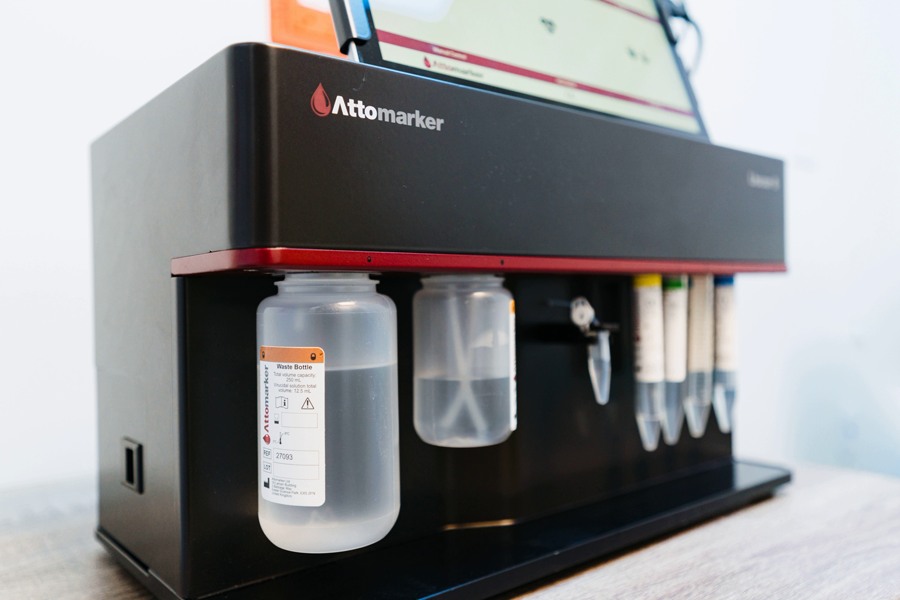GRAND CAYMAN- February 1, 2022 – Today, Integra Healthcare Ltd announces the release of a major technological advance in point-of-care diagnostics that helps take an important step towards personalised medicine and protection from Covid-19. The establishment of the first Attomarker Covid-19 Antibody Immunity Test this side of the Atlantic represents another regional first for both Integra and the Cayman Islands. This allows individuals to gain an accurate profile of their level of antibody protection against Covid-19 infection in just 7 minutes, helping to guide more informed health behaviours, including the timing of vaccination boosters.
The Attomarker platform is based on a core nanotechnology developed by award-winning scientists at Exeter University, with financial support from the UK Government. It is CE marked and approved by the Medicines and Healthcare products Regulatory Agency in the UK. The Covid-19 Antibody Immunity Test represents just the first of a number of point-of-care panels designed to address or support some of the most important and unmet diagnostic needs in healthcare today, such as monitoring Type 2 Diabetes patients in achieving remission or providing an ability to reduce unnecessary use of antibiotics in the global fight to combat antimicrobial resistance. As the first in the region to utilise the platform, the Cayman Islands has the opportunity to be at the forefront of solutions in these existing ‘pandemics’ and yet again demonstrate to the region and the world our ability to lead and innovate, this time in healthcare.
The Attomarker Covid-19 Antibody Immunity Test is now being rolled out across primary care clinics all over the United Kingdom. It detects the presence and amount of three different types of antibodies to various proteins in the Covid-19 virus, analysed from a small blood sample in just 7 minutes. This allows individuals to gain vital insight into their level of protection. Additionally, it also detects whether someone has antibodies following exposure to the virus, including identifying if the virus strain was Omicron, or purely from vaccination. Importantly, it also allows prediction of when the current level of protection will fall below what is considered necessary for adequate protection, enabling better timing of vaccination boosters.
Speaking about the importance of this, Dr Francisco Martinez, Director & Medical Director of Integra Healthcare, and one of the primary care team rolling it out, said; “We’ve always known that some people develop really good immunity following vaccination and others have a weaker or suboptimal response. We also know that protection degrades at very variable rates in different people, meaning some need earlier boosters to maintain protection and others might be better advised to wait longer. Given that the virus is likely to be here for years, timing of boosters becomes an important issue.”
Addressing the question of why populations shouldn’t just boost early, Dr Martinez explains; “Each time you have a vaccination, your immune system is sensitised by Covid-19 antigens. We’ve known since mouse studies conducted in 2009 that repeated exposure to the same antigen can cause something called autoimmunity in some cases, where the body’s immune system starts to attack itself. Autoimmune diseases are not something you want. The vaccine has been amazing at reducing infection, transmission, severe illness, hospitalisation, intensive care and death, but now we are in a phase of boosting, or repeating exposure to these antigens. We don’t know enough about the effects of this and there are already questions being asked in European Parliament and data emerging about the potential for autoimmunity in some individuals with excessively high antibody levels.”
Dr Sara Watkin, Director of Integra Healthcare and a respected tertiary paediatric doctor, has already advocated that the measures we take in the fight against Covid must be scientifically justifiable and avoid causing greater problems than the virus itself. Speaking about the technology and the advance it represents, she said; “I am a strong supporter of Covid-19 vaccination and of the importance of boosting. Both I and my husband had boosters at round 9 months after our first dose. However, at the time, we had no ability to know whether we were already under-protected and should have boosted earlier or retained higher levels of antibodies, and in which case more advised to perhaps delay re-dosing.”
“Fortunately, we can now find out and I hope that will mean that vulnerable people, especially those that don’t realise it because they’ve had a poor vaccine response or their antibodies have declined faster than average, can get the additional protection they need or protect themselves via better health behaviours. At the same time, this will allow us to reassure many people and allow some, those with significant antibody levels, to take more informed decisions about when boosting might be advisable. This will also hopefully allow the science to catch up on the autoimmunity questions too.”
Speaking about the importance of this to industry and the economy, Mr Andrew Vincent, Director of Integra Healthcare explained; “Companies have shouldered a huge cost and human burden at the hands of Covid-19 and it is still causing major disruption, especially in the tourism sector. This is a technology that allows you to rapidly assess the degree of immunity in your workforce, allowing you to better protect more vulnerable workers, and deploy people, for instance those facing the public or tourists, with much greater confidence. That has to make for better, more informed decision-making, and a step forward to a safer new normal.”
“I am especially excited at what comes afterwards too. The downstream panels nearing completion are focused on some of the most troublesome and costly healthcare burdens. In places like the Cayman Islands and elsewhere, Governments carry huge contingent liabilities for problems like obesity and diabetes, and the world is facing an antimicrobial resistance challenge. This technology is part of the equation in finding genuine solutions, leading to better health, while saving Governments, health systems and insurers very significant sums. At Integra, we have the scale and professionals to help develop those solutions using the Attomarker platform as a backbone. It’s genuinely exciting.”
Professor Andrew Shaw, CEO of Attomarker and one of the scientists behind the technology added; “We have to start managing life with Covid-19 better and getting back to work or school despite the continuing presence of the virus. But to do that, we also need to start guiding both policies and individual decisions more intelligently. We have individuals putting themselves at risk by waiting to fixed time points or even avoiding vaccination boosters out of fear, when they probably need them, and others who are causing very significant spikes in their antibody levels, consistent with autoimmunity, when they already have good protection. We can already see this from our testing. Personalising medicine and helping to get everybody back to a normal life is what inspired me to develop this technology, and I am really excited that the Cayman Islands, a British Overseas Territory, is leading on our International roll out.”
The Integra Healthcare Covid-19 Antibody Immunity Service involves a simple blood test, results in 7 minutes, fully explained, along with consultation on an individual’s personal risk factors and the behaviours and measures to address them.
For more information on the Integra Healthcare Attomarker Covid-19 Antibody Immunity Test visit:
/attomarker-triple-antibody-test/
For more information on Attomarker Ltd and the technology itself, visit:
https://www.attomarker.com/



